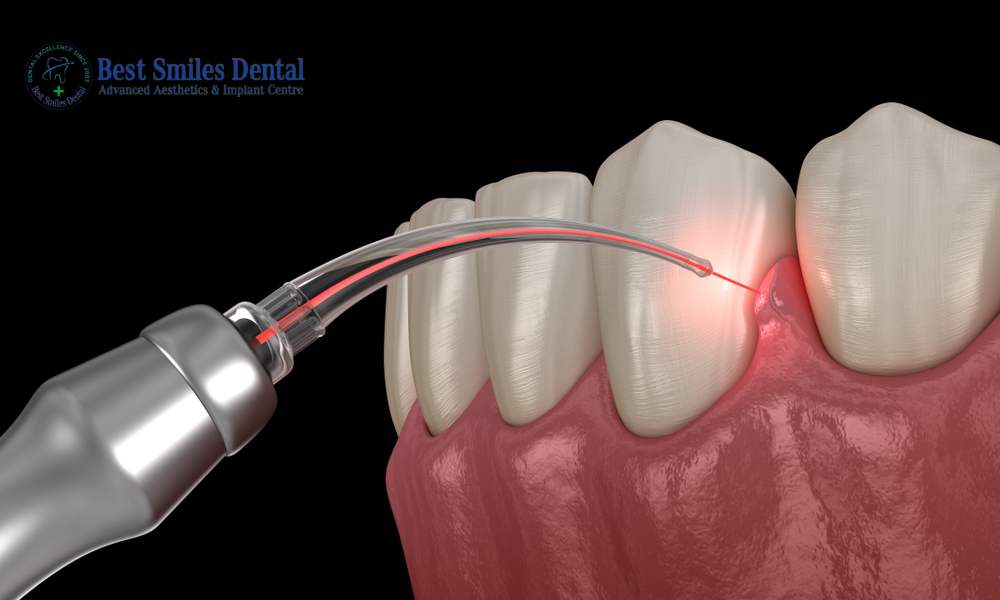Laser Gum Surgery for Periodontitis
Laser Gum Surgery for Periodontitis
Need Appointment ?
Laser Gum Surgery for Periodontitis
Laser gum surgery is a minimally invasive dental procedure that uses laser technology to treat periodontitis, a severe form of gum disease. The laser removes infected gum tissue, kills harmful bacteria, and promotes healing without the need for traditional surgical tools like scalpels or sutures.
Laser gum surgery has become more widespread for treating moderate to severe gum diseases. Laser stands for light amplification by stimulated emission of radiation.
Dentist may recommend laser gum surgery in lieu of non-laser surgeries, such as gum flap surgery. Laser gum surgery may also be used for other dental procedures. These include gum contouring to address a gummy smile for cosmetic reasons.
Book Appointment to find out which treatment might be best for you at Best Smiles Advanced Dental Clinic.

What is gum disease?
It may sound daunting, but gum disease is much more common than you might think, and most adults experience some form of it at some time in their lives.
- Red or swollen gums
- Bleeding gums when you brush or floss
- Sore gums
Gum disease can occur in different severities, and in the most severe cases, can lead to tooth loss and bone loss.
The earliest stage of gum disease – referred to as gingivitis – is fully reversible with a combination of professional dental treatments and a rigorous at-home oral hygiene routine. More severe periodontitis can only be slowed down, which is why it’s so important to catch gum disease in its earlier stages.
And the most effective way to halt the progression of gum disease is Laser Gum Treatment.
What causes gum disease?
Gum disease, otherwise known as periodontal disease, usually happens as a result of a build-up of plaque, which if left untreated eventually impacts the health of your gums.
Whilst plaque build-ups are the primary cause of gum disease, many other factors can contribute, including:
- Hormonal changes – the hormonal changes that occur within our bodies during puberty, monthly menstruation, pregnancy and menopause can make gums more sensitive – making it easier for gingivitis to develop.
- Illnesses – certain illnesses can affect the condition of your gum. These include both cancer and HIV, among others. Patients with these diseases are at a high risk of developing infections, including gum disease.
- Habits – nicotine use, be it in the form of traditional cigarettes or vapes, makes it difficult for your gum tissue to repair itself, leading to an increased risk of periodontal disease.
- Genetics – if your family members have a history of dental disease, you may be at an increased risk of developing periodontal disease.
- Oral hygiene habits – poor oral hygiene habits, like not brushing and flossing in between your teeth twice every day, make it much easier for bacteria to build up on your teeth and around the gum line, which puts you at an increased risk of developing gum disease.
How does laser gum surgery work?
Lasers are tubes that use powerful, pinpointed light beams of thermal energy to perform multiple tasks during gum surgery. Lasers can:
- cut and remove diseased tissue
- coagulate blood vessels to form solid clots
- kill germs and bacteria
- sterilize the area
Lasers work by creating an energy change in atoms. The laser light shifts atoms from their current resting state to a stage known as the excited state. This causes the atoms to produce energy called spontaneous emission.
When the atoms return to a resting state, they emit particles of light called photons. This process provides the energy needed to perform certain functions, such as cutting tissue without the use of a blade.
Who is a good candidate for laser gum surgery?
You may be a candidate for laser gum surgery if you:
- Have moderate to severe periodontitis.
- Experience symptoms like gum inflammation, bleeding, or pocket formation.
- Want a less invasive alternative to traditional gum surgery.
- Are looking for a quicker recovery with minimal discomfort.
Consult your dentist to determine if laser gum surgery is right for you.
What are the benefits of laser gum surgery?
- Minimally invasive with less bleeding and swelling.
- Faster healing time compared to traditional surgery.
- Reduced risk of infection due to sterilization by the laser.
- Precise targeting of infected tissue, preserving healthy gums.
- No need for stitches.

Pain-Free Dentistry
Comfortable, stress-free treatments every time.

Next-Gen Equipments
Precision care with advanced technology.

Expert Care Guaranteed
Trusted specialists for superior oral health.
Frequently Asked Questions
Discover everything you need to know about professional tooth cleaning and polishing. Learn how it removes plaque, enhances your smile, and promotes better oral health.
Laser gum surgery is generally less painful than traditional gum surgery. Local anesthesia is used to numb the area, and most patients report minimal discomfort during and after the procedure.
The duration depends on the severity of the gum disease and the number of areas being treated. Most sessions last between 1 to 2 hours, and multiple sessions may be required for comprehensive treatment.
The cost varies based on the severity of periodontitis and the extent of treatment required. On average, it can range from ₹15,000 to ₹50,000 or more. Check with your dentist for an accurate estimate and discuss financing options if needed.
Coverage depends on your dental insurance plan. Some policies may partially cover the procedure if it is deemed medically necessary. Contact your insurance provider for specific details.
- Brush and floss daily to maintain good oral hygiene.
- Schedule regular dental checkups and cleanings.
- Avoid smoking and maintain a healthy diet.
- Follow your dentist’s specific recommendations for ongoing gum care

